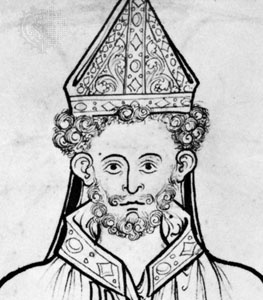Edmund of Abington, Saint
archbishop of Canterbury
original name Edmund Rich
born Nov. 20, 1175?, Abingdon, Berkshire, Eng.
died Nov. 16, 1240, Soisy, Fr.; feast day November 16
 distinguished scholar, outspoken archbishop of Canterbury, one of the most virtuous and attractive figures of the English church, whose literary works strongly influenced subsequent spiritual writers in England. After studies at Oxford—where he took a vow of perpetual chastity—and at Paris, he lectured (c. 1194–1200) in Paris and in Oxford, where he reportedly was the first to teach the philosophy of Aristotle. After further theological studies in Paris, he again taught at Oxford from about 1214 to 1222, when he became canon of Salisbury Cathedral, Wiltshire. In 1227 he preached in England for the Sixth Crusade at the request of Pope Gregory IX, who effected his elevation to archbishop of Canterbury in 1233 (consecrated April 2, 1234).
distinguished scholar, outspoken archbishop of Canterbury, one of the most virtuous and attractive figures of the English church, whose literary works strongly influenced subsequent spiritual writers in England. After studies at Oxford—where he took a vow of perpetual chastity—and at Paris, he lectured (c. 1194–1200) in Paris and in Oxford, where he reportedly was the first to teach the philosophy of Aristotle. After further theological studies in Paris, he again taught at Oxford from about 1214 to 1222, when he became canon of Salisbury Cathedral, Wiltshire. In 1227 he preached in England for the Sixth Crusade at the request of Pope Gregory IX, who effected his elevation to archbishop of Canterbury in 1233 (consecrated April 2, 1234).Edmund soon clashed with King Henry III of England, defending church rights and criticizing the king's continental policies. Reacting against Henry, the baronage ultimately supported Edmund. Civil war threatened. Edmund forced Henry (by threat of excommunication) to expel his wife's ambitious French relatives and allies from England and to abandon their projects. Edmund further made Henry promise to observe English law, customs, and the counsel of his native magnates. In 1236 Henry requested the pope to send him a legate, Cardinal Otho, who arrived the following year. Otho's presence helped to undermine the archbishop's power. Henry upheld the monks of Canterbury in their opposition to Edmund's authority, and Otho's silence on that issue failed to help the archbishop. Edmund finally protested before Henry and generally excommunicated all who had infringed upon the liberties of his primal see. He left for Rome, planning to appeal his case before the Curia, but poor health forced him to stop at Soisy, where he died. He was buried at Pontigny Abbey. His admirers demanded his immediate canonization, which Henry opposed until 1247. Although Edmund had been made head of the English hierarchy in a crisis for which he was not prepared, the purity of his motives and the loftiness of his ideals commanded universal respect.
Of the various writings that are ascribed to Edmund, those assuredly authentic include Speculum ecclesiae (Eng. trans. by F.M. Steele, 1905), a widely known devotional treatise considered a major contribution to medieval theology.
Additional Reading
C.H. Lawrence, St. Edmund of Abingdon: A Study in Hagiography and History (1960), compares the source documents in order to distinguish history from legend.
- additive
- Addo Elephant National Park
- adductor muscle
- ad- Dīnawarī
- Ade, George
- Adela
- Adelaer
- Adelaide
- Adelaide Crapsey
- Adelaide Hall
- Adelaide Kemble
- Adelaide Ristori
- Adelaide River
- Adelaide, Saint
- adelantado
- Adelard Of Bath
- Adela Rogers St. Johns
- Adelbert von Chamisso
- Adelina Patti
- Adeline Dutton Train Whitney
- Adelphi University
- Adelung, Johann Christoph
- Aden
- Adena culture
- Adenauer, Konrad